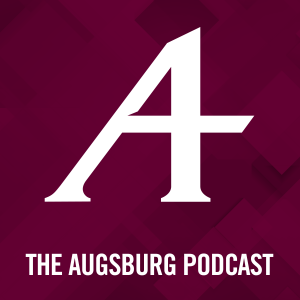The Augsburg Podcast

Amanda Case: Exploring the Fundamentals
Amanda Case: I really found a passion for fundamental science. I feel like a lot of people don't understand the importance that sort of this knowledge for the sake of knowledge has and how this kind of direction, right, having not necessarily having a- an application in mind leads to more breakthroughs, right? If you were to always sort of have an end game in mind, I feel like we wouldn't have these sort of quantum shifts. There wouldn't be a big change that ever occurred because we'd always make our decisions based on wanting an answer. Whereas if we're trying to gain knowledge, that's when we find these sort of revolutionary ideas that advance society.
Paul Pribbenow: Amanda Case, assistant professor of chemistry, teaches her students the fundamentals of science and of learning, how to investigate the world around them, and ask the questions that lead to insight. And she often learns surprising things herself along the way.
Augsburg University educates students to be informed citizens, thoughtful stewards, critical thinkers, and responsible leaders. I'm Paul Pribbenow, the president of Augsburg University, and it's my great privilege to present the Augsburg podcast, one way you can get to know some of the faculty and staff I'm honored to work with every day.
Amanda Case: So, I'm a physical chemist, which means basically that I like to take models, mathematical models, sort of physical pictures, and apply them to chemical problems.
I'm from Central Wisconsin, so I grew up in a small town called Marathon, which has a population of about a thousand people. Very small community, one high school, maybe a hundred people in a graduating class. Sort of typical, small, rural Wisconsin.
I knew that I didn't want to stay in my hometown. I knew that I didn't want to sort of have that factory existence, for a lack of a better word. And so, I went to a two-year campus, a UW college, but one that's geared at getting you into a four-year school. Got my degree at Stevens Point and then while I was there, someone said, "Oh, you should think about graduate school." I had no idea what graduate school was. No one in my family had ever gone to college before, let alone graduate school, right? The whole idea of academia was completely foreign to me. So, I went to graduate school and absolutely loved it. I feel like I ended up in exactly the right place doing exactly what I wanted to be doing, so I feel very fortunate about that.
You always tend to think of yourself in terms of what you've experienced, right? I was the product of divorced parents and we didn't have money. And my mom didn't graduate from high school, and therefore I had like the hardest road. But then when I talked to some students who are telling me about, you know, "Well, I had to work late," and then- then you're like, "Well, you know, is it really important that you work?" And then you realize, "Oh, you're supporting a child? Yeah, maybe it is okay that you miss class today." Right? Like in my mind, I might have had struggles, but I was a student, and that's what I did, and I worked on the weekends 'cause I had to pay tuition. But I worked on the weekends. I didn't have any other mouths to feed, right? Like I didn't have all of these other commitments or responsibilities. So, it's kind of humbling.
But it also kind of helps me think about how can I accommodate students without giving up the level of rigor that I kind of require of myself in terms of an academic standard, right? I can be compassionate with you, but I still need to teach you chemistry. So, how can I make both those things happen?
There are definitely a lot of people within our major that are first gen or who have sort of come from similar backgrounds of being in a rural place and not really feeling like it was for them, like they didn't fit in, or they didn't belong, or they didn't have the same viewpoints as everyone. I do think that the students sort of feel like, you know, they can talk to us about those sorts of things, and sort of make those connections that help them figure out where they are and how that fits.
The reason that I chose to come to a smaller school, to a liberal arts school was that ability to talk to people who aren't chemistry majors and to show them that even if it turns out that science isn't their vocation, they should understand its beauty and be able to have an intelligent conversation with someone about it. So, I very much would like to get more involved in teaching more gen ed classes, maybe things that are a little more interdisciplinary that get at some issues like science and democracy, right? Like what is the role of science, you know? There's a lot that can be done sort of on the edge of philosophical, scientific, political points and certainly Augsburg is the kind of place that should be thinking about those sorts of things.
Paul Pribbenow: That was Amanda Case, assistant professor of chemistry. Thanks for listening to the Augsburg podcast. I'm president Paul Pribbenow. For more information, please visit Augsburg.edu.






 Visit Podcast Website
Visit Podcast Website RSS Podcast Feed
RSS Podcast Feed Subscribe
Subscribe
 Add to MyCast
Add to MyCast